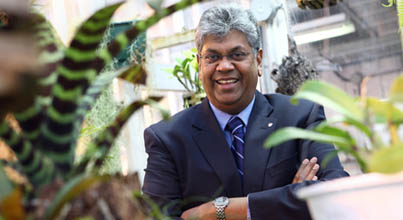Growing older, growing stronger: Mac turns 101
Growing older, growing stronger: Mac turns 101 McGill University
User Tools (skip):
Growing older, growing stronger: Mac turns 101

Chandra Madramootoo, Dean of the Faculty of Agricultural and Environmental Sciences, enjoying one of the many green spaces on Macdonald Campus.
Owen Egan
Established 101 years ago to help young Quebec farmers systematize and maximize their production, Macdonald campus has spent more than a century as both the bucolic backdrop and the living laboratory where but one thing matters: growth.
One needs look no further than the Morgan Arboretum for an example of growth at its most naturally spectacular. On top of containing examples of most of Quebec’s native trees and examples of trees and shrubs from around the world, 245-hectare forested reserve is also home to some 30 species of mammals, 20 species of reptiles and amphibians and more than 170 species of birds – including great horned owls, red-shouldered hawks and tiny chickadees who will fearlessly peck at seeds held in visitors’ outstretched hands.
And growth abounds elsewhere on campus in greenhouses, orchards, food engineering labs, the oldest major herbarium in the country and the fully functional research farm where 70 cows produce the equivalent of 8,000 glasses of award-winning milk a day.
Students first
But when Chandra Madramootoo, Dean, Faculty of Agricultural and Environmental Sciences is asked about growth at Mac, his first impulse is to talk about students. “Over the past five years, our undergraduate population has gone from around 600 students to more than 1,000,” he said. When you add the 460 or so graduate students at Mac, the student population swells to almost 1,500. Madramootoo credits several factors with this expansion, including added emphasis on freshman programs, advising and services; ongoing faculty renewal to attracting leading professors and researchers; and Faculty-initiated targeted recruitment that goes above and beyond the University’s regular recruitment efforts.
More significantly, the Faculty has revamped its undergrad academic offerings in a way that would make any horticulturalist proud – by trimming away low-enrolment courses and programs and replacing them with “niche areas” that focus upon many of the world’s most pressing, and most publicized, issues. “With all the hype surrounding things like climate change, the environment, biodiversity and sustainability, there seems to be a whole new movement of young people who feel passionate about doing something positive for the world,” said the Dean.
On the graduate studies side of the fence, the Faculty has attracted more students through increased support for graduate fellowships, and recently added graduate certificates in water management, biotechnology and bioprocessing. Madramootoo is particularly enthusiastic about a trio of “wonderful flagship non-thesis programs” in environmental assessment, biotechnology and integrated water resources management, programs that have been tapping into a new stream of students – already established professionals in industry and the government who are looking to upgrade their skills.
Growing in the field
Expansion and growth are also the watch-words when it comes to research. Vilceu Bordognon’s work with cloned pigs at Mac made headlines around the world in recent months, as has the work of Don Smith in biofuels and bioprocessing. “We’re growing the research infrastructure,” said Madramootoo, “and we’re continuing to seek out new research and funding opportunities.”
One of the strong suits of Mac research is its ability to give undergrads invaluable experience in the field, working with some of the world’s leading researchers. “We train them here at Macdonald and then get them out in the field as research assistants very early,” Madramootoo said. “They can’t believe they’d be working alongside someone like Grace Egeland in the Arctic or Roger Pritchard in Africa. How can they not come back a changed person after that?”
Change isn’t reserved for people, however. Madramootoo views Mac’s abundance of space as a natural counterbalance to the downtown campus’s increasing need for space – and a potential relationship that will invite further collaboration. “Certainly the School of the Environment has been a godsend, a miracle,” Mandramootoo said. “It has shown that even if there are limitations to growth downtown, McGill’s expansion in such disciplines as the environmental sciences could very well happen out here.”
Although it’s Madramootoo’s job to know the numbers behind Mac’s expansion on all fronts, he understands better than most that much of Mac’s transformative power can’t be measured by numbers alone. “Sometimes I go down to Lac St. Louis and sit by the water with a book and it’s the most invigorating experience to flush my mind and clear the clutter,” he said. “I grew up on a farm, and I still conduct a lot of my own agricultural experiments. Being able to go out and kick some dirt or auger a hole with some students – that’s what’s really special.”

